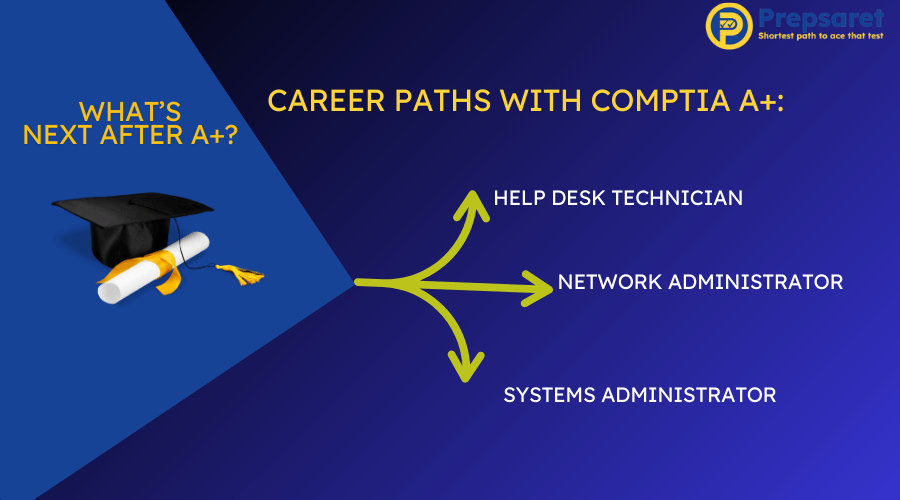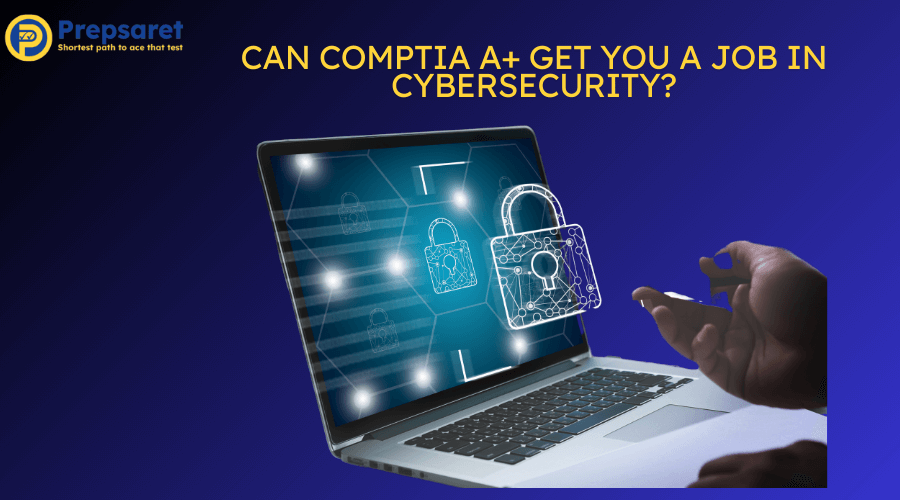In today’s ever-evolving tech landscape, CompTIA A+ certification is one of the most widely recognized credentials for entry-level IT professionals. Whether you’re aiming for roles like a help desk technician, IT support specialist, or network administrator, CompTIA A+ provides the foundational knowledge and skills needed to step into the IT field.
So, can you get a job with just CompTIA A+? The answer is yes! While additional certifications and experience can certainly be beneficial, many companies hire entry-level IT professionals with just CompTIA A+ certification. This credential opens the door to a variety of job opportunities in IT, especially for those just starting their careers.
To ensure you’re well-prepared for the CompTIA A+ exams and ready to land a job, consider using prepsaret.com. This platform offers comprehensive practice questions and effective study tools to help you pass your exams with confidence. With the right preparation, you’ll be on your way to securing an IT job in no time!
What Jobs Can I Get with a CompTIA A+?

A CompTIA A+ certification opens up a wide range of career opportunities for those looking to enter the IT field. It demonstrates your foundational knowledge in IT and positions you well for various support and technical roles.
If you’re asking, “can you get a job with just compTIA A+”, here’s a list of common positions available to you:
- Help Desk Technician
Help desk technicians act as the first point of contact for IT-related issues, offering troubleshooting support for hardware and software problems. They often assist users over the phone, via email, or through live chat. - IT Support Specialist
IT support specialists maintain computer systems and provide technical support to users, ensuring the smooth operation of IT services within an organization. They handle everything from system repairs to software troubleshooting. - Field Service Technician
This role involves traveling to client locations to install, repair, or maintain IT equipment and systems. It’s ideal for individuals who enjoy a mix of technical work and travel. - Technical Support Specialist
A technical support specialist provides assistance to users experiencing technical issues. This role requires strong problem-solving skills and the ability to communicate technical information in a way that is understandable for end-users. - Desktop Support Administrator
A desktop support administrator focuses on maintaining desktop environments, troubleshooting hardware/software issues, performing installations, and ensuring that all systems are running smoothly for end-users. - Associate Network Engineer
While this is often a more advanced role, CompTIA A+ certification can help you start as an associate network engineer. You’ll support network infrastructure, monitor systems, and assist with network configurations to ensure a business’s IT environment is functioning well. - Data Support Technician
In this role, you’ll manage data systems, ensure data integrity, and provide support for data-related issues. This job is critical for organizations that depend on accurate and reliable data systems. - System Support Specialist
System support specialists are responsible for maintaining and troubleshooting various IT systems within an organization. This role often involves both hardware and software components, ensuring systems operate smoothly. - Installation Technician
Installation technicians set up IT equipment at client sites, including computers, peripherals, and networking devices. This role is a great fit for hands-on individuals who enjoy working directly with hardware. - Tier II IT Support Technician
Tier II IT support technicians handle more complex technical issues that cannot be resolved by Tier I technicians. This role typically requires more in-depth technical knowledge and experience in troubleshooting.
These positions represent just a handful of CompTIA A+ certification jobs that are available to individuals entering the IT industry.
Whether you’re working directly with clients, troubleshooting systems, or supporting network infrastructure, jobs with CompTIA A+ provide a solid foundation for career growth and specialization in IT.
Entry-Level IT Jobs with CompTIA A+ Certification
When you’re starting your career in IT, CompTIA A+ certification can be your ticket to landing entry-level positions. As the technology industry continues to grow, the demand for skilled IT professionals is on the rise, and CompTIA A+ serves as a foundation for a wide range of entry-level roles.
Many employers consider CompTIA A+ certification as the minimum requirement to get started in IT, especially for those with limited professional experience.
Entry-level IT jobs are often ideal for individuals who are just starting their career in technology. These roles provide an opportunity to gain hands-on experience, learn the basics of troubleshooting, and expand your technical skills in real-world environments.
Here are some entry-level IT jobs that candidates can pursue with a CompTIA A+ certification:
- Help Desk Technician: Provides technical support to users, troubleshooting hardware and software issues.
- IT Support Specialist: Maintains computer systems and networks, ensuring operational efficiency.
- Field Service Technician: Travels to client locations to install and repair IT equipment.
- Desktop Support Specialist: Assists users with desktop-related issues and performs system upgrades.
- Technical Support Specialist: Offers assistance via phone or chat, resolving technical problems for customers.
These roles often require no prior experience beyond the certification itself, making them accessible to newcomers in the field.
Jobs with CompTIA A+ are Accessible with No Experience
For those looking for CompTIA A jobs with no experience, the certification opens doors to numerous opportunities. Many employers are willing to hire candidates who possess the A+ certification even if they lack hands-on experience. This is because the certification demonstrates a baseline level of competence in critical IT skills such as:
- Installing and configuring operating systems
- Troubleshooting network connectivity issues
- Understanding security fundamentals
- Performing hardware repairs and upgrades.
Importance of CompTIA A+ Certification
The CompTIA A+ certification validates essential skills in hardware, software, networking, and troubleshooting, equipping candidates with the knowledge necessary for various IT roles.
This certification is recognized by employers across multiple sectors, serving as a benchmark for entry-level IT jobs. According to industry insights, 96% of HR managers use IT certifications like CompTIA A+ as a screening criterion during recruitment processes.
Can You Get an IT Job with Just Certifications Reddit?
Many in the IT community, including discussions on platforms like Reddit, suggest that while certifications such as CompTIA A+ are beneficial, they are often not sufficient by themselves to secure a job. Employers look for a combination of education, certifications, and hands-on experience. However, there are numerous accounts of individuals successfully landing positions solely with this certification.
For example, many entry-level roles in technical support and help desk positions explicitly state that they accept candidates with just a CompTIA A+ certification and no prior experience.
Do Companies Hire People with Just a CompTIA A+?
Yes, many companies do hire individuals with only a CompTIA A+ certification. Organizations like Intel, Dell, and HP frequently list the certification as a preferred qualification for roles such as IT support specialist and help desk technician.
This indicates that while additional experience may be advantageous, the certification itself is often viewed as a solid foundation for entry-level positions.
Is CompTIA A+ Enough for a Help Desk?
The CompTIA A+ certification is generally considered sufficient for securing a help desk position. Help desk roles typically require knowledge of troubleshooting hardware and software issues, which the A+ certification covers extensively.
It equips candidates with skills in areas such as operating systems, networking, and security—key competencies needed in help desk environments.
Many professionals have reported starting their careers in help desk roles directly after obtaining their A+ certification without any prior experience.
Real-World Insights
Feedback from the IT community emphasizes that while certifications like CompTIA A+ can greatly improve your resume and show your dedication to the field, practical experience is just as important.
Gaining hands-on experience through internships, volunteer work, or personal projects can make you a more competitive candidate.
Additionally, many employers look for soft skills such as communication, teamwork, and problem-solving abilities, alongside technical knowledge. These skills can be just as crucial in helping you land an IT job.
The Salary Outlook for CompTIA A+ Jobs

A common question when considering CompTIA A+ certification is: How much can you earn with a CompTIA A+ certification? While salaries can vary based on several factors, having a CompTIA A+ certification generally positions you for competitive pay in the IT field.
The salary for individuals with CompTIA A+ certification can differ based on location, job type, and experience level. However, even for entry-level positions, the salary potential can be promising.
CompTIA A+ Jobs Salary Expectations
For individuals holding a CompTIA A+ certification, salaries can vary widely based on the specific job role and other influencing factors. Here are some average salary figures for common positions associated with this certification:
- Help Desk Technician: Approximately $35,000 to $50,000 per year, with an average around $48,478.
- IT Support Specialist: Average salary of about $56,586.
- Field Service Technician: Average salary is approximately $61,908.
- Desktop Support Analyst: Ranges from $45,000 to $60,000 annually.
- Data Support Technician: Average salary around $48,367.
Overall, entry-level salaries for those with a CompTIA A+ certification typically start at around $40,000, with the potential to increase significantly with experience and additional certifications.
Factors Influencing CompTIA A+ Salary
Several key factors influence the salary of individuals with a CompTIA A+ certification:
- Location: Salaries can differ based on geographic location. For example, urban areas with a high demand for IT professionals may offer higher salaries compared to rural regions.
- Job Type: Different roles come with varying responsibilities and corresponding salary ranges. Technical support roles may offer lower starting salaries compared to specialized positions like network engineering.
- Experience Level: Entry-level positions typically pay less than roles requiring more experience. As professionals gain hands-on experience and advance in their careers, their earning potential increases. For instance, those with several years of experience can earn upwards of $60,000 or more annually.
How Much Can You Earn with a CompTIA A+ Certification?
While starting salaries for CompTIA A+ certified professionals can range from $30,000 to over $60,000, experienced individuals in specialized roles may earn significantly more.
Reports indicate that the average salary for those holding a CompTIA A+ certification globally is around $83,798, while in the U.S., it can reach approximately $89,965.
CompTIA A+ Salary for Career Growth
As you continue to grow in your IT career, the CompTIA A+ salary can serve as a stepping stone toward more advanced positions. After gaining experience and possibly adding other certifications to your resume, you could eventually transition to higher-paying roles, such as network engineer or systems administrator, which pay much more than entry-level positions.
Overall, CompTIA A+ certification provides a solid foundation for entry-level IT roles with salaries that are competitive within the industry. As you gain experience and further qualifications, your earning potential can grow significantly.
Is CompTIA A+ Enough to Start a Career in IT?
The CompTIA A+ certification is a well-respected entry-level credential in the IT world. It’s specifically designed for those starting out in IT support roles, covering essential topics such as hardware, networking, operating systems, and troubleshooting.
Is CompTIA A+ worth it for a career in IT?
Yes, it is. Many companies recognize the value of the CompTIA A+ certification and view it as proof of your foundational knowledge. It’s often enough to help you land an entry-level job, such as IT support specialist, help desk technician, or desktop support.
For those looking to get a foot in the door, the A+ certification can be a solid starting point.
Start CompTIA A+ 220-1101 Prep Today
Can I get a job with only a CompTIA A+ certification?
In some cases, yes. There are companies that will hire you based solely on your CompTIA A+ certification, especially if you’re applying for entry-level positions that emphasize technical troubleshooting, computer hardware, and basic networking.
However, while you can get started with just this certification, many employers will look for additional experience or certifications as you advance in your career.
Is A+ certification worth anything?
The A+ certification does have value, particularly for those entering the IT industry. It demonstrates that you have the foundational skills necessary to troubleshoot and maintain hardware, software, and networks.
However, its worth is sometimes limited to entry-level positions, and many employers may prefer candidates with additional certifications like Network+ or Security+ or relevant work experience.
Additional Certifications or Experience May Be Necessary
While some companies will hire based solely on CompTIA A+, many others look for a combination of experience and advanced certifications.
Roles in specialized areas like network administration, cybersecurity, or system administration usually require more than just A+—they may call for certifications like CompTIA Network+, CompTIA Security+, or even vendor-specific certifications from companies like Cisco or Microsoft.
Preparation for CompTIA A+ Certifications
If you’re looking to continue growing your IT career, preparation for additional certifications will be key. Prepsaret.com can be a valuable resource to help you prepare for all CompTIA certifications, ensuring you’re ready to tackle more advanced exams and move forward in your IT career.
Career Paths with CompTIA A+: What’s Next After A+?

CompTIA A+ is a fantastic entry point into the world of IT, equipping you with foundational skills in computer hardware, networking, and troubleshooting. But once you’ve earned your A+ certification, the real question becomes: What’s next?
After obtaining your CompTIA A+, you’ll find a variety of career paths available in IT, particularly in entry-level roles like IT support technician, help desk specialist, and technical support. However, A+ serves as a stepping stone toward more advanced and specialized roles. Here’s a look at some common career paths after A+:
- IT Support Specialist / Help Desk Technician:
These entry-level roles typically serve as the starting point for many IT professionals. As a help desk technician, you’ll troubleshoot hardware and software issues, assist end-users, and provide technical support. It’s a great foundation for learning about various systems and networks.
- Network Administrator:
After gaining experience with hardware and basic networking from the A+ certification, you can pursue roles like a Network Administrator. In this role, you’ll focus on managing and maintaining computer networks, configuring routers and switches, and ensuring network security and performance.
Best certifications for IT jobs to follow this path:
- CompTIA Network+
- Cisco Certified Network Associate (CCNA)
- Systems Administrator:
A Systems Administrator manages and maintains an organization’s IT infrastructure, including servers, operating systems, and network systems. This role requires deeper knowledge of system configurations, security protocols, and troubleshooting.
Best certifications for IT jobs to pursue:
- CompTIA Linux+ (if you’re working in Linux environments)
- Microsoft Certified: Windows Server Fundamentals
- Cybersecurity Specialist:
As cyber threats continue to grow, many IT professionals use A+ as a stepping stone to enter the cybersecurity field. Cybersecurity Specialists protect an organization’s systems, data, and networks from cyber threats. A deeper understanding of networks and security measures is critical in this role.
Best certifications for IT jobs to explore:
- CompTIA Security+
- Certified Information Systems Security Professional (CISSP)
- Cloud Administrator:
With the rise of cloud computing, IT professionals with skills in cloud platforms are in high demand. A Cloud Administrator manages cloud services and virtualized environments, working with platforms like AWS, Azure, and Google Cloud.
Best certifications for IT jobs to consider:
- CompTIA Cloud+
- AWS Certified Solutions Architect
CompTIA A+ provides the foundational knowledge necessary to step into more specialized IT roles. Once you’ve gained experience, earning certifications such as CompTIA Network+, CompTIA Security+, or vendor-specific certifications (like Cisco’s CCNA or Microsoft’s MCSA) will help you advance further into your IT career. These certifications build on the skills you learned with A+ and position you for higher-paying, more senior roles.
To move forward in your IT career and earn these advanced certifications, it’s crucial to continue studying and gaining practical experience. Prepsaret.com offers preparation resources for all CompTIA certifications, so you’ll be well-equipped to take on your next challenge in the IT world.
Can You Get CompTIA A+ Jobs with No Experience?
Obtaining a job in IT with only a CompTIA A+ certification is indeed possible, even without prior professional experience. Many employers recognize the value of this certification as a demonstration of foundational IT skills, making it a viable option for those looking to enter the field.
Do You Need Experience to Get a Job with CompTIA A+?
While experience is often preferred, CompTIA A+ jobs with no experience are still quite attainable, particularly in positions like IT support technician, help desk technician, or desktop support roles.
These entry-level jobs are designed for people who are new to the field, and employers often value the knowledge gained through certification, even without prior professional experience.
The CompTIA A+ certification demonstrates your ability to handle the basic hardware, software, and networking issues that are common in many IT environments. For employers, that means you can hit the ground running and start contributing right away.
How to Gain Experience and Stand Out
If you’re concerned about your lack of hands-on experience, there are several ways you can still gain the skills needed to make yourself more marketable for IT jobs:
- Internships:
Internships are one of the best ways to gain real-world experience. Many companies offer internships specifically for entry-level IT positions where they expect candidates to have foundational knowledge, like what is covered in CompTIA A+. An internship allows you to apply what you’ve learned in a controlled environment and often leads to full-time employment after the internship ends.
- Volunteering:
Volunteering your IT skills for local charities, schools, or non-profit organizations is another excellent way to gain practical experience. You might assist with troubleshooting computers, setting up networks, or providing tech support. Not only does this allow you to practice and build your skills, but it also helps you build a strong resume and network with others in the IT community.
- Freelance Work:
Freelancing is an excellent way to build your experience while still gaining the flexibility to grow your skill set. You can offer services like computer repair, software installation, or troubleshooting for individuals or small businesses. Platforms like Upwork, Fiverr, or local job boards often have freelance IT opportunities for those with certifications but little to no experience.
- Personal Projects and Labs:
Set up a home lab where you can experiment with building computers, configuring networks, or setting up virtual machines. This allows you to gain hands-on experience on your own time and showcase it during interviews or on your resume.
The Role of CompTIA A+ in Government Jobs
CompTIA A+ certification can open the door to a variety of government IT jobs, providing a solid foundation for those interested in public sector positions. Government agencies often prioritize technical skills and certifications like CompTIA A+ because they guarantee that employees possess the essential knowledge required to handle the IT systems that support government operations.
There are numerous CompTIA A+ government jobs available at the federal, state, and local levels. Many government agencies seek professionals with foundational IT knowledge to maintain their computer systems, support staff, and ensure the security and functionality of their networks. Some common roles include:
- IT Support Specialist:
- Government organizations need IT support specialists to assist with hardware and software issues, troubleshoot technical problems, and maintain equipment. CompTIA A+ provides the skills necessary to troubleshoot and repair computers, which is crucial in this role.
- Help Desk Technician:
- Many government agencies hire help desk technicians to provide remote or in-person support for employees dealing with IT problems. With CompTIA A+, you can troubleshoot software issues, network connectivity problems, and assist with system setups.
- Network Administrator:
- While more advanced roles like network administrators might require additional certifications, some government agencies may hire individuals with CompTIA A+ as part of their entry-level training, with the expectation that they will gain further certifications like CompTIA Network+ or CCNA over time.
- Cybersecurity Roles:
- For those interested in cybersecurity, some entry-level positions in government agencies may require or prefer CompTIA A+ as a starting point. Cybersecurity teams in government positions often begin with roles like Security Operations Center (SOC) Analyst or IT Security Support and may require additional specialized training as you advance in the field.
Job Security and Benefits in Government IT Roles
One of the major advantages of working in government IT jobs is the job security and benefits they offer. Government positions are typically more stable than private sector jobs, with many agencies providing long-term career paths. Some key benefits include:
- Competitive Salary:
- Government jobs often come with competitive salaries, particularly as you gain experience and move into higher-level roles.
- Comprehensive Benefits:
- Many government positions offer excellent benefits, including health insurance, retirement plans, paid time off, and job stability. The government sector is known for providing generous benefits packages to employees.
- Work-Life Balance:
- Government IT roles often have more predictable work schedules compared to the private sector, allowing for a better work-life balance.
- Opportunities for Advancement:
- With CompTIA A+ certification, you can get your foot in the door, but the government sector also offers ample opportunities for career growth. You can continue advancing by earning additional certifications or moving into higher-level positions like systems administrator, network engineer, or cybersecurity specialist.
If you’re interested in government IT roles, searching for CompTIA A+ jobs on Indeed or using location-based searches such as jobs requiring CompTIA A+ near me can help you find opportunities in your area. Many government job portals also list IT positions requiring CompTIA A+ or similar qualifications.
What Are the Best IT Certifications for Beginners?

Starting a career in IT can be overwhelming, but earning the right certifications can help you stand out and gain the foundational knowledge needed to succeed .
Here’s a look at some of the best IT certifications for beginners, including CompTIA A+, and why they are beneficial.
-
CompTIA A+ Certification
CompTIA A+ is widely considered one of the best starting points for those new to the IT field. It covers the fundamentals of computer hardware, software, networking, security, and troubleshooting—skills that are essential for many entry-level IT positions.
With a CompTIA A+ certification, you can pursue a variety of entry-level IT jobs such as IT support technician, help desk analyst, and desktop support specialist.
You can easily find CompTIA A+ certification jobs on LinkedIn, which often include roles like IT technician or computer technician at companies of all sizes.
-
CompTIA IT Fundamentals (ITF+)
Designed for absolute beginners, this certification introduces basic IT concepts and terminology.It prepares candidates for further certifications like CompTIA A+, helping them build confidence and foundational knowledge.
-
CompTIA Network+
If you’re interested in networking, CompTIA Network+ is a fantastic next step after CompTIA A+. It dives deeper into networking concepts like protocols, IP addressing, and network troubleshooting. It’s ideal for those who want to move into network administration or network support roles.
With a Network+ certification, you can apply for network technician, network support specialist, or IT infrastructure roles.
-
Microsoft Certified: Fundamentals (Azure Fundamentals, Microsoft 365 Fundamentals)
Microsoft certifications are excellent for those looking to get into cloud computing and office productivity platforms. The Microsoft Certified: Fundamentals certifications, like Azure Fundamentals or Microsoft 365 Fundamentals, provide a solid understanding of cloud services, cloud architecture, and Microsoft software.
These certifications open up positions in cloud administration, technical support, and Microsoft-focused IT roles.
-
Cisco Certified Network Associate (CCNA)
For those interested in networking, CCNA is an ideal certification to pursue after gaining some foundational knowledge. It’s more advanced than CompTIA A+ and Network+, but still suitable for beginners who want to build expertise in routing, switching, and network security.
A CCNA can help you pursue roles as a network administrator, network engineer, or IT support specialist in organizations with complex networking needs.
Why CompTIA A+ is Recommended for Newcomers to IT
CompTIA A+ is often recommended for newcomers to the industry because it offers a comprehensive introduction to IT. The certification helps you build essential skills in hardware, software, networking, and troubleshooting—skills that are crucial in nearly every IT job.
Since A+ is widely recognized and respected, it allows you to apply for various entry-level roles and gain real-world experience that will help you grow into more specialized roles later in your career.
Additionally, CompTIA A+ provides a clear path for career progression. Many professionals start with CompTIA A+ and then move on to higher certifications like CompTIA Network+, CompTIA Security+, or vendor-specific certifications such as Cisco’s CCNA or Microsoft’s MCSA.
Can CompTIA A+ Get You a Job in Cybersecurity?

CompTIA A+ is an excellent starting point for anyone looking to enter the IT field, but when it comes to transitioning into cybersecurity roles, additional steps are usually necessary.
While CompTIA A+ can help you get your foot in the door, it is not sufficient on its own for securing more specialized cybersecurity positions. For those looking to move into cybersecurity, pursuing additional certifications is recommended.
Certifications such as CompTIA Security+, CompTIA Cybersecurity Analyst (CySA+), and CompTIA Advanced Security Practitioner (CASP+) provide deeper insights into security practices and threat management, which are essential for roles in this field.
Job Opportunities
Many employers list CompTIA A+ certification jobs on Glassdoor, indicating that while entry-level IT support roles may be accessible with just the A+ certification, more advanced cybersecurity positions will require further credentials.
FAQs
Is the A+ Certification Enough to Get a Job?
While it's sufficient for many entry-level roles, additional experience or certifications may be required for career advancement.
Is CompTIA A+ Enough for a Help Desk?
Absolutely, it covers essential troubleshooting and technical skills needed for help desk positions.
Is A+ Certification Worth Anything?
Yes, it is highly regarded and serves as a valuable credential for starting an IT career.
Is CompTIA A+ Enough to Start an IT Career?
Yes, it provides a solid foundation for various entry-level IT roles.
Do You Need Experience to Get a Job with CompTIA A+?
Not necessarily; internships, volunteering, or freelance work can enhance your profile.
What Entry-Level IT Jobs Require CompTIA A+?
Positions like help desk technician, field service technician, and IT support specialist typically require this certification.
How Hard Is It to Get a Job with CompTIA A+?
It is generally achievable for entry-level positions, especially with good networking and soft skills.
Can CompTIA A+ Get You a Job in Cybersecurity?
While it lays a good foundation, additional certifications like Security+ are often necessary for cybersecurity roles.

